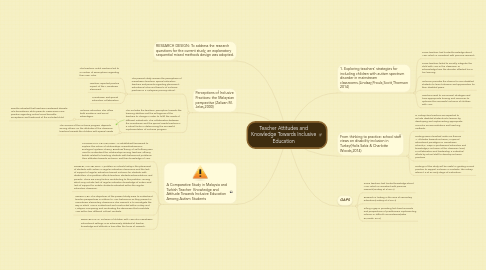Teacher Attitudes and Knowledge Towards Inclusive Education
da Emine Ozel EREN

1. RESEARCH DESIGN: To address the research questions for the current study, an explanatory sequential mixed methods design was adopted.
2. Perceptions of Inclusive Practices: the Malaysian perspective (Zalizan M. Jelas,2000)
2.1. The present study reviews the perceptions of mainstream teachers, special education teachers and parents regarding placement, educational roles and bene ts of inclusive practices in a Malaysian primary school.
2.1.1. The teachers’ initial reactions led to a number of assumptions regarding their own roles.
2.1.2. Teachers reported positive impact of the Mainstream Placement .
2.1.3. Mainstream and special education collaboration.
2.2. This includes the teachers’ perception towards the learning abilities and the willingness of the teachers to change in order to fulfill the needs of different individuals. The collaboration between the mainstream and the special needs teachers is a critical factor in determining the successful implementation of inclusive program.
2.2.1. Inclusive education also offers both academic and social advantages.
2.2.1.1. Results indicated that teachers maintained discrete role boundaries, while parents’ views were more positive regarding mutual social benefits, acceptance and treatment of the included child.
2.2.2. The success of the inclusive program depends among others, on the attitudes of the classroom teachers towards the children with special needs
3. A Comparative Study in Malaysia and Turkish Teacher Knowledge and Attitude Towards Inclusive Education Among Autism Students
3.1. CONCEPTUAL FRAMEWORK: An established framework to explore this notion of relationships is Bronfenbrenner’s Ecological Systems Theory. Banduras`theory of Self-efficacy was used to understand the relationships among teachers’ efficacy beliefs related to teaching students with behavioural problems, their attitudes towards inclusion, and their knowledge of ASD.
3.2. PROBLEM STATEMENT: A problem in schools today is the placement of students with autism in regular education classrooms and the lack of support of regular educators toward inclusion for students with disabilities. This problem affects teachers, students,administrators, and parents. There are many factors contributing to this problem, among which may include lack of regular educators knowledge of autism and lack of support for autistic students educated within the regular education classroom.
3.3. OBJECTIVES: The objectives of the present study were to understand teacher perspectives in relation to ASD behaviours as they present in mainstream elementary classrooms.This research is to investigate the way in which ASD is understood and constructed within Turkey and Malaysia, comparing and contrasting the discourses that constitute ASD within two different cultural contexts.
3.4. RESEARCH GAP: Inclusion of children with ASD into mainstream educational settings is an extensively debated of teacher knowledge and attitude is less often the focus of research.
4. 1. Exploring teachers' strategies for including children with autism spectrum disorder in mainstream classrooms.(Lindsay,Proulx,Scott,Thomson 2014)
4.1. Some teachers had limited knowledge about ASD, which is consistent with previous research
4.2. Some teachers failed to socially integrate the child with ASD in the classroom or acknowledge how the disorder affected his or her learning.
4.3. Inclusion provides the chance for non-disabled students to learn tolerance and appreciation for their disabled peers.
4.4. Teachers need to use several strategies and have appropriate training and resources to optimize the successful inclusion of children with ASD
5. From thinking to practice: school staff views on disability inclusion in Turkey(Halis Sakiz & Charlotte Woods,2014)
5.1. In Turkey,class teachers are expected to include disabled students into lessons by developing and implementing appropriate curricular accommodations and teaching methods.
5.2. Findings were classified under six themes :1.Attitudes towards inclusion; 2.Special educational paradigms in mainstream schools;3. Gaps in professional education and knowledge;4.Inclusion at the classroom level; 5.Collaboration and leadership; 6.Individual efforts by school staff to develop inclusive practices
5.3. Findings of this study will be useful in guiding current practice to support inclusion in contexts, like Turkey, where it is at an early stage of maturation.
6. GAPS
6.1. Some teachers had limited knowledge about ASD, which is consistent with previous research(Lindsay et al 2014)
6.2. Research is lacking in the area of secondary education(Lindsay et al 2014)
6.3. Filling a gap in providing first-hand accounts and perspectives of practitioners implementing reforms in difficult circumstances(Sakiz &Woods, 2014)


